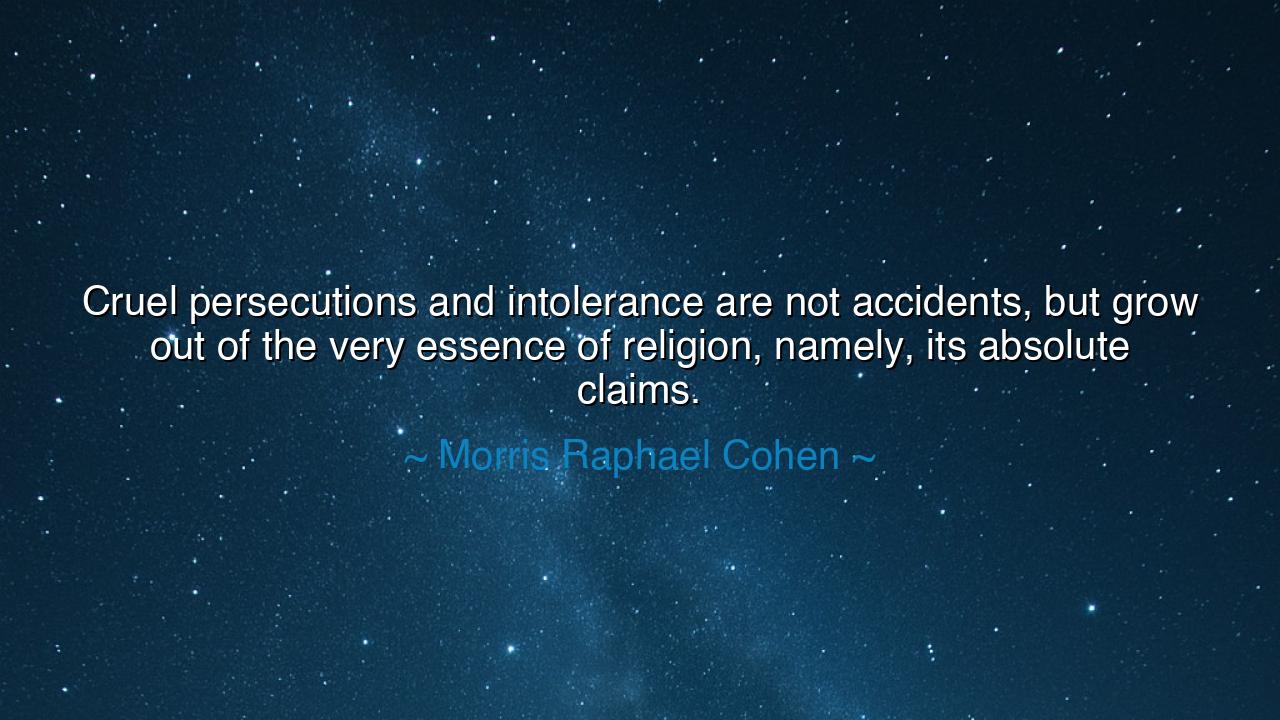
Cruel persecutions and intolerance are not accidents, but grow
Cruel persecutions and intolerance are not accidents, but grow out of the very essence of religion, namely, its absolute claims.






Morris Raphael Cohen, a philosopher who gazed deeply into the nature of belief, declared with sober clarity: “Cruel persecutions and intolerance are not accidents, but grow out of the very essence of religion, namely, its absolute claims.” These words strike like thunder in the silence, for they remind us that religion, though a fountain of comfort and hope, has also been a sword of division. When a faith declares itself the sole keeper of truth, it inevitably casts all others into the shadows of error, and from this shadow springs the temptation to persecute, to silence, and to destroy.
The ancients bore witness to this. When Rome clung to its many gods, it was tolerant of diversity, yet when Christianity rose and claimed one truth, it clashed with pagan temples until the old shrines lay in ruins. Likewise, when Islam spread across lands, it carried both mercy and the command of truth absolute, challenging the traditions it encountered. Cohen’s insight is that these conflicts were not mere chance, not mere accidents of history—they flowed from the very absolute claims of religion itself, for when one truth is proclaimed supreme, all rivals become threats to be subdued.
Consider the tragedy of the Inquisition. In Spain, the Catholic Church, certain of its exclusive claim to salvation, hunted Jews, Muslims, and dissenters. Families were torn apart, books burned, men and women tortured in dungeons in the name of faith. These persecutions were not the acts of a few cruel men—they were the outgrowth of a belief that there could be no compromise with error, no tolerance for difference. Here we see Cohen’s teaching: intolerance is not an accident, but the natural child of absolutes.
And yet, O listener, do not let despair take root. For while the absolute claims of religion have given birth to cruelty, they have also given birth to courage. Many martyrs—Jews in exile, Christians under Rome, Muslims defying tyrants—stood firm because they too believed in absolutes. The same fire that fuels persecution also fuels endurance, and thus the paradox: that faith can oppress, but also inspire resistance against oppression. The danger is not faith itself, but faith without humility, faith without compassion.
Therefore, the lesson shines clear: beware of any creed that leaves no room for difference, any leader who proclaims that doubt is sin, any teaching that demands obedience without question. When truth is proclaimed as absolute, let it also be tempered by mercy. The heart of wisdom is not to destroy the other, but to seek the divine in them as well. For only when absolutes are balanced with love can religion rise above its shadow and become a beacon rather than a whip.
Look to the story of Roger Williams, founder of Rhode Island. In the 1600s, cast out by Puritan Massachusetts for his radical idea of freedom of conscience, he built a colony where no man was persecuted for his faith. His belief was firm, but his principle was freedom. From him we learn that absolutes need not birth cruelty—when guided by humility, they can birth liberty instead. Here lies the remedy to Cohen’s warning: not the abandonment of belief, but the refusal to let belief become a weapon.
Practical wisdom flows from this: in your own life, hold fast to your convictions, but do not demand that others kneel before them. Defend your truth, but do not silence another’s. Seek dialogue rather than domination. For if history has taught us anything, it is that empires built on persecution crumble, but communities built on tolerance endure.
So take this to heart, O children of tomorrow: persecutions and intolerance are not accidents—they arise wherever men take their absolutes and sharpen them into swords. Let your absolutes, then, be love, compassion, and justice. Wield these, and you shall never enslave, but only uplift. In this way, the very essence of religion can be transformed, not into chains, but into wings.






AAdministratorAdministrator
Welcome, honored guests. Please leave a comment, we will respond soon